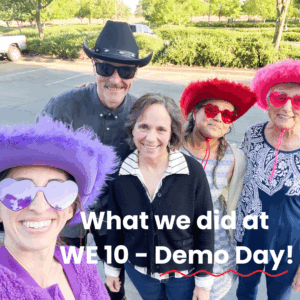There are a few “presuppositions” I learned when I was trained as a coach 10 years ago. A presupposition, in this context is a premise, a place to come from that supports what coaching is all about – change and growth.
Recently I have been thinking about this one:
There is no Failure. There is only Feedback.
This presupposition is useful because of the different ways in which most of us hear/use the words “failure” and “feedback.” “Failure” tends to evoke some degree of “badness,” of criticism of oneself. “Feedback” tends to produce more of a question – why do I have this result?
Every week on coaching calls, my clients make certain “declarations” – promises to themselves that I have agreed to ask about the following week.
Here is what I have observed. Because of the negative and self-critical energy around the word “failure,” the more people say they have “failed” in their declaration to do something, the less they want to attempt it. To get around this feeling of failure, many people enter declarations by saying, “I will try” to do this. But consider the difference between saying, “I will try” to do it; and “I will” do it. Notice how each feels to you. Usually saying, “I will do it,” gives a far greater sense of commitment. Commitment is the thing that will have you actually complete the task. If you are unwilling to commit to it when you state it, you have already set yourself up for not doing it. “I will try” does not support any kind of success. Of course, it also does not create a sense of failure.
So there is the conundrum. It takes courage to commit. Because in fact you may “fail.” But commitment is required to actually do the thing. Enter the presupposition. What if there was no failure? What if all of your results (whether you like them or not) where in fact simply feedback?
Here’s a personal example: I committed to work out 5 days this week. I work out early in the morning. I was too tired this morning because I stayed to watch my son’s senior presentations until late last night. I got up on time, but I did not go to the workout because I felt tired. I could call that a failure. I could say, “Hey, I was up. I could have pushed through. What’s my problem?”
Or I could call it feedback. If it is feedback, I get to be curious about what happened and examine myself. When I do that, I notice that sometimes when I go to bed later than normal I do have the energy in the morning and sometimes I don’t. Maybe a can create a new strategy for when I stay out later than usual. When I looked at it that way, I realized it was not really a failure. It was a choice. And then I thought to myself, “What would I do now if I was truly committed to 5 days of exercise this week?” And so I have found a different time today to go. Had I focused on failure and feeling bad about myself, there is a good chance I would not have asked myself what I could do now in order to meet my commitment. I just would have failed. The conversation would end with me being a “failure.” But seeing it as feedback had the effect of actually starting a new conversation with myself.
Additionally (and this may be the bigger point), had I been afraid to fail when I made the declaration at the beginning of the week (because I DID know it would be a stretch to meet it), I would have said, “I will try.” And then I would not have the commitment before me now. The commitment that had me say to myself, “I did not go this morning. What else can I do to reach 5 times this week? Because I promised myself that I would.” Had I said at the beginning of the week, “I will try to work out 5 times,” I would be able to let it go today because “I tried.”
And so. The willingness to stretch myself – to commit to 5 times knowing that would be challenging – took courage. The decision to view my not going this morning as something other than failure — as feedback — allowed me to look and to learn. And the fact that I had a commitment in front of me and was not in the throws of “failure,” allowed me to say, “okay; how else can I fulfill this commitment?”
People often try to force themselves to keep agreements by using the word “failure” when they do not. But it seems to have the opposite effect. The fear of failure often keeps people from committing in the first place.
__________________
ANNOUNCEMENT
Enrollment is the Art of Collaborative Communication.
Enrollment is a specific communication skill that is effective everywhere. Using this skill will vastly improve all your results – in business and elsewhere throughout your life.
When you master this skill of communication, you will be able to enroll:
• potential clients and customers in hiring you, buying your product or service
• people in referring business to you
• your staff into doing their jobs and doing them well
• supervisors in supporting you in doing your job
• team-members in working together
• clients in paying you on time
• your children in cooperating with you
In this workshop, you will learn the R.E.A.L.I.T.Y.™ model of enrollment – a specific communication tool that will afford you the results above and more.
Participants will learn how to:
• quickly and easily create rapport and trust with others
• ask the right questions to generate a high degree of ownership and follow through
• listen so others feel heard
• speak in a way that others are inspired to take committed action
• create win-win agreements
• help people overcome perceived obstacles in order to create tangible outcomes
June 19 (Tuesday)
1:30pm — 4:30pm
$149/person
$140/person for 2 or more from same company
Register today:
https://www.eventbrite.com/e/enrollment-the-art-of-collaborative-communication-tickets-43781560827
Testimonial
“Cami has taught me that effective communication and enrollment is NOT about getting someone else to see things your way. Effective communication, and the concept of enrollment, is about truly listening and understanding the other person or the other side. With this understanding, you can communicate more effectively and advance your objective with someone else in a way that causes them to be really committed, because they really believe it for themselves. It is a way to find common ground and value that often leads to a better result than just convincing someone to do it your way. Cami is an incredible teacher of these subtle nuances in communication and learning just a small fraction of these skills has made a world of difference in both my personal and professional life.”
–Heather Johnston, Owner, Sapphire Law Group






